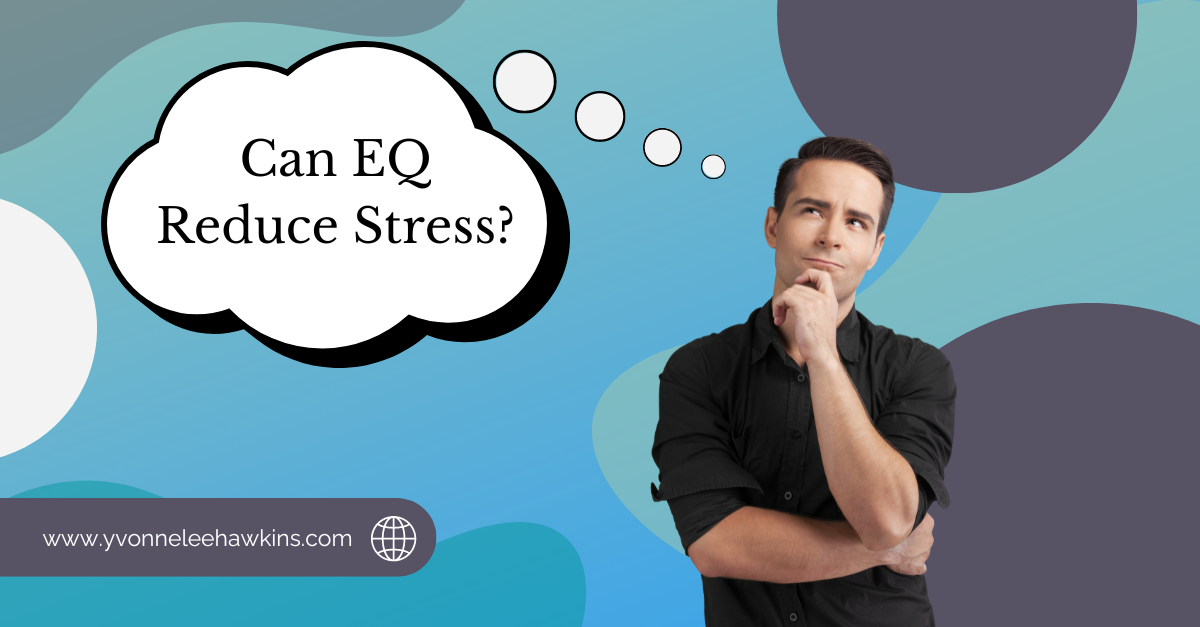We know that having a high EQ can help you climb the corporate ladder, being able to manage people, relationships, and office politics. But can it also help you reduce stress?
Contrary to popular belief that caring too much will stress you out, having high EQ can actually help you reduce your stress and lead a more fulfilling life. Read on to find out why.
Emotional intelligence (EI), also called emotional quotient (EQ), is a valuable concept for handling stress and improving our quality of life. Let’s discuss what emotional intelligence is, its key parts, and how to use it to manage stress. We’ll also include tips to help you strengthen your emotional
intelligence muscles.
What is Emotional Intelligence?
Having EQ means recognizing, understanding, and managing our own emotions, as well as the emotions of others. People with high Emotional Intelligence can put themselves in other people’s shoes and predict how they might react. This skill is especially useful for leaders. When leaders lack EQ, it can lead to miscommunication, frustration, and poor team performance. Leaders who don’t
understand their team’s emotions may struggle to solve problems or keep their employees
engaged. Everyone has a need to be understood, so leaders who lack EQ will
struggle to connect with this basic need.
Key Components of Emotional Intelligence:
Self-Awareness Self-awareness is the ability to understand your own emotions, strengths, weaknesses, and values. It is the foundation of emotional intelligence. Without knowing how you
feel, it’s difficult to understand how others feel.
Self-Regulation This is the ability to control your emotions, especially in stressful situations,
and stay positive. Leaders who cannot control their emotions may lose their
temper and create a negative atmosphere for their team. Employees tend to avoid
working for such leaders, leading to high turnover rates. Or worse, appease
these leaders by staying out of their way, creating an environment that stifles
creativity and progress.
Motivation People with high EI are often self-motivated. They stay focused on their goals and
don’t give up when they face obstacles. They can see the bigger picture and are
driven by positive outcomes. They tend to persist even in the face of adversity.
Empathy Empathy is the ability to understand and share the feelings of others. It helps us form
stronger relationships and navigate social challenges. Empathetic leaders can
see where their team might need help and offer support. This is especially
useful when managing a diverse team with varying experience levels or
backgrounds.
Social Skills EQ also includes good social skills, which help us manage relationships,
communicate well, and work effectively with others. Leaders who lack social
skills can make it harder for their teams to succeed. Even introverts can have
strong social skills that help them connect with and lead their teams. A leader who might be genius in one area, say mathematics, falls flat as a leader if he doesn’t have at least somewhat competent
social skills to understand cues and relationships.
By improving our self-awareness, self-regulation, motivation, empathy, and social skills, we can recognize and manage stress more effectively and create a positive environment for ourselves and others.
How EI Helps Manage Stress
We can manage stress more effectively if we have the ability
to be self-aware, self-regulate, have empathy and create social support. With
strong self-awareness, we can recognize early signs of stress and act before it
gets worse. This awareness allows us to understand our feelings and take steps
to calm down or seek help when needed.
Self-regulation is about managing our emotions so we can
stay calm under pressure. It helps us focus during stressful times instead of
reacting with anger or frustration. Leaders who can control their emotions will
get more out of their teams. For
example, a leader who yells and screams anytime there is a setback will soon
find himself surrounded by people who hide mistakes or challenges rather than
bring them out in the open to be solved.
Empathy helps us manage stress by connecting with others and
building relationships. These relationships can act as a support system during
stressful times, making us feel less alone. Friends, colleagues, and family
might offer helpful advice based on their own experiences or give you a
different perspective to the problem.
But what if you don’t have high EQ? Can you build your Emotional Intelligence?
If your emotional intelligence is low, don’t worry. You can
improve it with practice. Here are practical ways to do that:
Developing Self-Awareness: You can increase self-awareness by practicing
mindfulness, keeping a journal, and asking for feedback from others.
Mindfulness means focusing on the present without judgment, which helps us
notice our thoughts and feelings. Journaling helps us see patterns in our
emotions and reactions, while feedback from trusted people gives us a different
view of how we act.
Improving Self-Regulation: To better manage emotions, try deep breathing
exercises, like diaphragmatic breathing or the 4-7-8 technique, which calm the
nervous system. Another method is to reframe negative thoughts into more
positive ones. For example, instead of thinking “bad things always happen
to me,” you can say, “this bad thing happened, but I can handle it
and find a solution.” Taking a moment to pause before reacting helps
control strong emotions and avoid impulsive actions you might later regret.
Building Intrinsic Motivation: This motivation comes from within, like the
desire for personal growth or fulfillment. To boost this motivation, set goals
that mean something to you personally and celebrate even small successes.
Focusing on progress helps you stay motivated and reinforces good habits. A
growth mindset, where challenges are seen as opportunities to learn, helps
build resilience and stay positive through setbacks.
Developing Empathy:
You can build empathy by practicing active listening. This involves
giving your full attention, asking open-ended questions, and reflecting on what
the other person is feeling. One helpful trick is to clasp your hands together
while listening, which reduces distractions and shows you’re focused. Then,
imagine yourself in their situation and how would you feel. This can give you invaluable insight into how
and why they are behaving in a certain way.
Strengthening Social Skills: Good social skills help build and maintain
healthy relationships, which are important for handling stress. Start by
practicing clear communication. Be honest about your feelings and needs while
respecting others’ views. Staying calm and assertive helps prevent conflicts
from escalating. It’s like handling a small problem early, before it grows into
something unmanageable. Another key is
to care about the other person and what they are going through. It is easier to
build relationships when you don’t need anything, so invest in relationships
early.
Networking can also be a key to success. Build a supportive
circle of friends, family, and colleagues. Surround yourself with supportive
people and create strong connections before you need help. By giving and
sharing with your network, they’re more likely to offer support when you need
it later.
How to Use Emotional Intelligence in Stressful Situations
Workplace Stress:
Use your time management skills to prioritize tasks, set realistic deadlines, and delegate when needed. Good time management can ease the pressure of deadlines.
Set Boundaries by creating clear limits around where work
begins and ends and where your personal time begins. Revisit these boundaries
regularly. Most of us slide in this area at least occasionally.
Build Relationships using empathy and good communication to
create strong connections with coworkers. These relationships can provide
support during tough times and can help you celebrate during major milestones.
Personal Relationships:
Communicate Openly by sharing your feelings and listening to others without interrupting or judging. Focus on understanding their perspective.
Resolve Conflicts using calm, empathetic approaches to solve problems. Work together to find solutions that make everyone feel heard and included.
Seek Support by sharing your feelings with loved ones for emotional support.
Self-Care and Resilience:
The best way to be open and able to calmly relate to others
is to ensure your own physical and mental health is in good shape. Exercising
regularly, eating a balanced diet, and getting enough sleep are key components
of being able to use your EI. Physical health directly affects emotional
well-being.
Being mindful and practicing things like meditation, deep
breathing, or yoga are all ways to become more aware and reduce stress. Gratitude
can also go a long way. Take time each day to notice and appreciate small
positive moments.
Building emotional intelligence helps you manage stress,
improve relationships, make you a better leader and best of all create a more
fulfilling life. While some seem to be
naturally born with EQ, it is a skill that can be learned and strengthened.
Let me know if this topic adds value for you. Please like
and subscribe if you want more leadership and wellness topics like this, or comment
or DM me. I always love suggestions and feedback!
And if you are too burned out and overwhelmed to even begin
to use any of these strategies it might be time to get some help. Find a coach,
therapist, or doctor who can help you reverse out of the physical, mental, and
emotional symptoms of burnout so you can get back to living in healthy balance.
Remember, Self-care isn’t selfish…it’s required!
Yvonne Lee-Hawkins, IPHM, is a holistic wellness coach, stress strategist, and writer, who spent 20 years in corporate and leadership functions. When she is not working, she loves to go on nature adventures with
her family, in the Pacific Northwest where they call home. You can find out more on her website,
or follow her on LinkedIn, Medium, or Instagram.
If you want some help with delegation, Burnout recovery or general wellness, schedule a call here.

